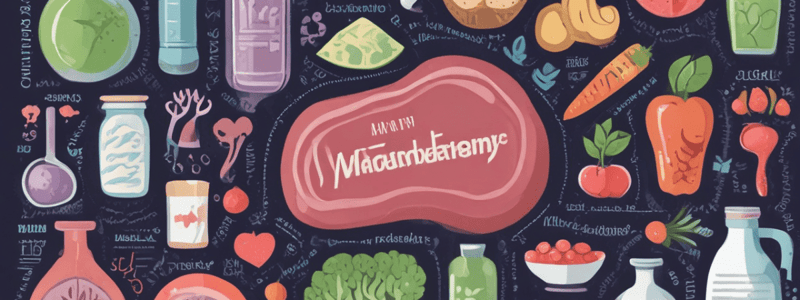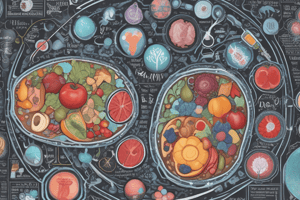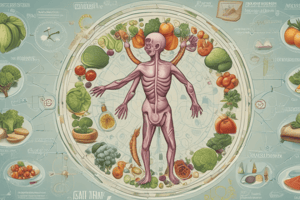Podcast
Questions and Answers
What is the main challenge for consumers when it comes to nutrition and health-related information?
What is the main challenge for consumers when it comes to nutrition and health-related information?
To understand how scientists collect evidence about nutrition and health and how to analyze this information to determine whether it is factual and based on scientific evidence or misinformation.
Why do registered dietitian nutritionists (RDNs) discard conventional beliefs, explanations, and practices?
Why do registered dietitian nutritionists (RDNs) discard conventional beliefs, explanations, and practices?
When the results of current scientific research no longer support them.
What is the difference between anecdotal evidence and scientific evidence?
What is the difference between anecdotal evidence and scientific evidence?
Anecdotal evidence is based on personal experiences or testimonials, whereas scientific evidence is based on systematic observation, measurement, and experimentation.
Why is it important to have controls in scientific experiments?
Why is it important to have controls in scientific experiments?
What is the goal of understanding the scientific method in the context of nutrition and health?
What is the goal of understanding the scientific method in the context of nutrition and health?
What is the difference between a direct (positive) relationship and an inverse (negative) relationship between two variables?
What is the difference between a direct (positive) relationship and an inverse (negative) relationship between two variables?
Why do similar scientific studies often have different results?
Why do similar scientific studies often have different results?
What is the main limitation of relying on intuition, common sense, and conventional wisdom in nutrition and health?
What is the main limitation of relying on intuition, common sense, and conventional wisdom in nutrition and health?
What is the primary purpose of conducting laboratory experiments on small mammals before performing similar research on humans?
What is the primary purpose of conducting laboratory experiments on small mammals before performing similar research on humans?
What is the term for an experiment that uses whole living organisms, such as mice?
What is the term for an experiment that uses whole living organisms, such as mice?
Why do researchers review published scientific studies before conducting an experiment?
Why do researchers review published scientific studies before conducting an experiment?
What is the purpose of a control group in an experiment?
What is the purpose of a control group in an experiment?
What is a variable in the context of an experimental study?
What is a variable in the context of an experimental study?
Why is it important to control other variables in an experiment?
Why is it important to control other variables in an experiment?
What do scientists record during an experiment?
What do scientists record during an experiment?
Why do medical researchers need to be careful when applying the results of in vivo animal studies to humans?
Why do medical researchers need to be careful when applying the results of in vivo animal studies to humans?
What do scientists follow when conducting research?
What do scientists follow when conducting research?
What is the term for an experiment conducted on cells or components derived from living organisms?
What is the term for an experiment conducted on cells or components derived from living organisms?
What is the main purpose of conducting experimental studies in nutrition research?
What is the main purpose of conducting experimental studies in nutrition research?
What is a randomized controlled trial (RCT), and why is it used in experimental studies?
What is a randomized controlled trial (RCT), and why is it used in experimental studies?
Why do researchers need a large group of human subjects in an RCT?
Why do researchers need a large group of human subjects in an RCT?
What is the purpose of a placebo in an RCT?
What is the purpose of a placebo in an RCT?
Why is it important to keep the placebo and treatment indistinguishable from each other?
Why is it important to keep the placebo and treatment indistinguishable from each other?
What was the name of the disease that was widespread in the United States in the early 1900s, and what was the prevailing view of its cause at that time?
What was the name of the disease that was widespread in the United States in the early 1900s, and what was the prevailing view of its cause at that time?
What observation led Dr. Joseph Goldberger to suspect that pellagra was not an infectious disease?
What observation led Dr. Joseph Goldberger to suspect that pellagra was not an infectious disease?
What dietary factor did Dr. Goldberger suspect was linked to the development of pellagra?
What dietary factor did Dr. Goldberger suspect was linked to the development of pellagra?
What is the significance of Dr. Goldberger's research on pellagra?
What is the significance of Dr. Goldberger's research on pellagra?
What is the broader implication of Dr. Goldberger's research on pellagra?
What is the broader implication of Dr. Goldberger's research on pellagra?
What were the staple foods in the diet associated with pellagra in the southern United States?
What were the staple foods in the diet associated with pellagra in the southern United States?
What did Dr. Goldberger observe about people who did not develop pellagra?
What did Dr. Goldberger observe about people who did not develop pellagra?
What did Dr. Goldberger give to children in two Mississippi orphanages and patients in a Georgia mental institution to test his dietary hypothesis?
What did Dr. Goldberger give to children in two Mississippi orphanages and patients in a Georgia mental institution to test his dietary hypothesis?
What was the purpose of Dr. Goldberger's 'filth party' experiment?
What was the purpose of Dr. Goldberger's 'filth party' experiment?
What was finally identified as the cause of pellagra in 1929?
What was finally identified as the cause of pellagra in 1929?
Why is it important to maintain secrecy in double-blind studies?
Why is it important to maintain secrecy in double-blind studies?
What could happen if investigators know which subjects are in the control group during a study?
What could happen if investigators know which subjects are in the control group during a study?
Why are placebos used in human experimental studies?
Why are placebos used in human experimental studies?
What is the purpose of codes in double-blind studies?
What is the purpose of codes in double-blind studies?
What is the main advantage of double-blind studies over single-blind studies?
What is the main advantage of double-blind studies over single-blind studies?
What is the primary goal of nutritional epidemiologists?
What is the primary goal of nutritional epidemiologists?
What type of studies do epidemiologists typically conduct to investigate the relationship between diet and disease?
What type of studies do epidemiologists typically conduct to investigate the relationship between diet and disease?
What is the main purpose of a case-control study?
What is the main purpose of a case-control study?
What is the difference between retrospective and prospective cohort studies?
What is the difference between retrospective and prospective cohort studies?
What type of information is typically collected in a retrospective dietary study?
What type of information is typically collected in a retrospective dietary study?
What is the purpose of NHANES?
What is the purpose of NHANES?
Why is it often difficult to determine a single variable responsible for the development of a chronic disease?
Why is it often difficult to determine a single variable responsible for the development of a chronic disease?
What do nutritional epidemiologists study in populations to learn about the influence of diet on health?
What do nutritional epidemiologists study in populations to learn about the influence of diet on health?
What type of data is collected in a cohort study?
What type of data is collected in a cohort study?
What do researchers hope to identify by conducting case-control studies?
What do researchers hope to identify by conducting case-control studies?
What is the placebo effect, and how does it occur?
What is the placebo effect, and how does it occur?
What is the nocebo effect, and how does it differ from the placebo effect?
What is the nocebo effect, and how does it differ from the placebo effect?
What is prevalence, and how is it used in epidemiological studies?
What is prevalence, and how is it used in epidemiological studies?
What is a main limitation of retrospective cohort studies in epidemiological research?
What is a main limitation of retrospective cohort studies in epidemiological research?
What is epidemiology, and what is its role in understanding health problems?
What is epidemiology, and what is its role in understanding health problems?
What is the primary goal of a prospective cohort study?
What is the primary goal of a prospective cohort study?
How do epidemiologists determine the occurrence, distribution, and causes of health problems?
How do epidemiologists determine the occurrence, distribution, and causes of health problems?
What is an example of how epidemiologists use data to identify the cause of a health problem?
What is an example of how epidemiologists use data to identify the cause of a health problem?
What is an example of a well-known prospective cohort study?
What is an example of a well-known prospective cohort study?
Why can epidemiological studies not establish causation?
Why can epidemiological studies not establish causation?
Why is it important to use controls in epidemiological studies?
Why is it important to use controls in epidemiological studies?
What is the role of surveys in epidemiological studies?
What is the role of surveys in epidemiological studies?
What is an example of a direct correlation?
What is an example of a direct correlation?
How do epidemiologists use data from physical examinations and laboratory tests?
How do epidemiologists use data from physical examinations and laboratory tests?
What is an example of an inverse correlation?
What is an example of an inverse correlation?
Why might an observed correlation between two variables not necessarily indicate a cause-and-effect relationship?
Why might an observed correlation between two variables not necessarily indicate a cause-and-effect relationship?
What is the ultimate goal of epidemiological studies?
What is the ultimate goal of epidemiological studies?
What is a limitation of extrapolating findings from prospective cohort studies to the general population?
What is a limitation of extrapolating findings from prospective cohort studies to the general population?
What is the significance of the Framingham Heart Study in understanding risk factors for heart disease?
What is the significance of the Framingham Heart Study in understanding risk factors for heart disease?
Why is it important to consider the limitations of epidemiological studies when interpreting their findings?
Why is it important to consider the limitations of epidemiological studies when interpreting their findings?
What is the main reason scientists should avoid relying on personal attitudes and biases when collecting and analyzing data?
What is the main reason scientists should avoid relying on personal attitudes and biases when collecting and analyzing data?
What is the purpose of peer review in scientific journals?
What is the purpose of peer review in scientific journals?
In the mid-1960s, how did the sugar industry influence research on heart disease?
In the mid-1960s, how did the sugar industry influence research on heart disease?
What is the significance of the shift in leading causes of death in the United States from infectious diseases to chronic diseases?
What is the significance of the shift in leading causes of death in the United States from infectious diseases to chronic diseases?
What is the primary purpose of statistical methods in nutrition research?
What is the primary purpose of statistical methods in nutrition research?
Why is it important for researchers to summarize and publish their findings in scientific journals?
Why is it important for researchers to summarize and publish their findings in scientific journals?
What was the hypothesis supported by John Yudkin regarding heart disease?
What was the hypothesis supported by John Yudkin regarding heart disease?
Why is it important for researchers to avoid confusing correlation with causation?
Why is it important for researchers to avoid confusing correlation with causation?
What is the role of funding sources in shaping research outcomes?
What is the role of funding sources in shaping research outcomes?
What is the purpose of drawing conclusions and reporting findings in research?
What is the purpose of drawing conclusions and reporting findings in research?
What factor contributed to the development of the dietary pork taboo among followers of Islam and Judaism?
What factor contributed to the development of the dietary pork taboo among followers of Islam and Judaism?
Why were pigs not a practical food source for nomadic populations in the Middle East?
Why were pigs not a practical food source for nomadic populations in the Middle East?
In what year did a paper published in JAMA Internal Medicine expose the likelihood that the sugar industry used their influence to divert attention away from sugar’s role in the development of heart disease?
In what year did a paper published in JAMA Internal Medicine expose the likelihood that the sugar industry used their influence to divert attention away from sugar’s role in the development of heart disease?
What was the main objective of the paper published in The New England Journal of Medicine in 1967?
What was the main objective of the paper published in The New England Journal of Medicine in 1967?
What is trichinosis, and how can it be prevented?
What is trichinosis, and how can it be prevented?
Why may have multiple factors contributed to the development of religious laws prohibiting the consumption of pork?
Why may have multiple factors contributed to the development of religious laws prohibiting the consumption of pork?
Why is it important for authors to disclose their sources of funding in peer-reviewed nutrition journals?
Why is it important for authors to disclose their sources of funding in peer-reviewed nutrition journals?
What is a potential consequence of raising pigs in areas where food and water are scarce?
What is a potential consequence of raising pigs in areas where food and water are scarce?
What type of sources generally provide very little information concerning the way a study was conducted or how the data were collected and analyzed?
What type of sources generally provide very little information concerning the way a study was conducted or how the data were collected and analyzed?
What is a characteristic of popular magazines that distinguishes them from peer-reviewed scientific journals?
What is a characteristic of popular magazines that distinguishes them from peer-reviewed scientific journals?
Why do scientists whose research efforts depend on food, dietary supplement, or pharmacological industry support may emphasize positive research findings and minimize negative findings?
Why do scientists whose research efforts depend on food, dietary supplement, or pharmacological industry support may emphasize positive research findings and minimize negative findings?
What do peer-reviewed nutrition journals usually require authors to disclose?
What do peer-reviewed nutrition journals usually require authors to disclose?
Why is it impossible to eliminate all research bias?
Why is it impossible to eliminate all research bias?
What is the primary purpose of conducting experimental studies in nutrition research?
What is the primary purpose of conducting experimental studies in nutrition research?
What is the significance of requiring authors to disclose their sources of funding in scientific journals?
What is the significance of requiring authors to disclose their sources of funding in scientific journals?
What contributes to the confusion and conflict that consumers experience when trying to understand nutrition information?
What contributes to the confusion and conflict that consumers experience when trying to understand nutrition information?
Why do popular sources of nutrition information, such as magazines, often feature sensational health claims?
Why do popular sources of nutrition information, such as magazines, often feature sensational health claims?
What is the significance of replication in scientific research?
What is the significance of replication in scientific research?
What is a common characteristic of food taboos?
What is a common characteristic of food taboos?
Why do scientists often discard old beliefs and practices in nutrition research?
Why do scientists often discard old beliefs and practices in nutrition research?
What is the main limitation of relying on sensational media coverage of nutrition research?
What is the main limitation of relying on sensational media coverage of nutrition research?
How do individual differences between people contribute to variation in research results?
How do individual differences between people contribute to variation in research results?
What is the purpose of peer-reviewed scientific journals in nutrition research?
What is the purpose of peer-reviewed scientific journals in nutrition research?
Why do nutrition researchers need to be cautious when interpreting the results of a single study?
Why do nutrition researchers need to be cautious when interpreting the results of a single study?
What is the relationship between the scientific method and the evolution of nutrition knowledge?
What is the relationship between the scientific method and the evolution of nutrition knowledge?
Study Notes
Nutrition: Science for Consumers
- The scientific method involves making observations, generating questions, developing a hypothesis, and testing the hypothesis through experiments and data analysis.
- Nutrition scientists use the scientific method to determine the effects of dietary practices on health.
The Scientific Method
- The scientific method involves the following steps:
- Make observations
- Generate questions
- Develop a hypothesis
- Review literature
- Design an experiment
- Conduct the experiment
- Analyze data
- Draw conclusions
- Laboratory experiments, including in vitro and in vivo experiments, are used to test hypotheses.
- In vivo experiments use whole living organisms, such as mice, to test the effects of a variable, such as a chemical, on the body.
- In vitro experiments use cells or components derived from living organisms to test the effects of a variable in a controlled environment.
Animal Experimentation
- Animal experiments are used to test hypotheses and provide evidence-based information about nutrition.
- Experiments involve dividing animals into treatment and control groups to compare the effects of a variable.
- Control groups are necessary to compare the results of the treatment group to a baseline.
- Variables must be controlled to ensure accurate results.
Human Research: Experimental (Intervention) Studies
- Experimental studies involving human subjects are used to test the effects of dietary interventions on health.
- Researchers use randomized controlled trials (RCTs) to randomly assign participants to treatment or control groups.
- Placebos are used in control groups to mimic the treatment being tested.
- Double-blind studies are used to prevent bias, where neither the researchers nor participants know who is in the treatment or control group.
Human Research: Epidemiological Studies
- Epidemiological studies are used to understand the occurrence, distribution, and causes of health problems in populations.
- Epidemiologists use data collected from physical examinations, laboratory tests, and surveys to determine factors that affect health.
- Types of epidemiological studies include:
- Case-control studies: compare individuals with a health condition to those without the condition.
- Cohort studies: follow a group of people over time to observe the development of health conditions.
Placebo and Nocebo Effects
- The placebo effect is a positive response to a treatment or intervention due to expectations.
- The nocebo effect is a negative response to a treatment or intervention due to expectations.
- Placebos can produce real physiological and psychological changes, especially in conditions involving pain.
Importance of Evidence-Based Information
- Nutrition information derived from anecdotes and testimonials is not evidence-based.
- It is important to critically evaluate nutrition information and consider the source and quality of the evidence.
- Scientific research provides a reliable basis for understanding the relationships between nutrition and health.### Epidemiological Studies
- Case-control studies: compare people with a health condition (cases) to those without the condition (controls) to identify long-term dietary practices that may be associated with the development of the health problem
- Cohort studies: collect and analyze information about a large group of people over time to identify associations between exposure to a specific factor and the subsequent development of health conditions
- Retrospective cohort studies: collect information about a group's past exposures and identify current health outcomes
- Prospective cohort studies: follow a group of healthy people over time to record any diseases that develop and analyze the data to identify links between exposures and diseases
Limitations of Epidemiological Studies
- Cannot establish causation, only identify correlations between variables
- Correlations can be direct (positive) or inverse (negative)
- Correlations do not necessarily indicate a cause-and-effect relationship between variables
- Results can be influenced by research bias, funding sources, and personal attitudes
Analyzing Data and Drawing Conclusions
- Nutrition researchers use statistical methods to analyze data and identify relationships between variables and health outcomes
- Results are summarized and published in scientific journals, which undergo peer review before acceptance
- Peer review involves critical analysis by experts in related research fields to ensure the study was well-conducted and the results are fairly represented
Research Bias
- Scientists are expected to avoid personal biases and report results objectively and honestly
- Funding sources can influence research outcomes and expectations
- Disclosure of funding sources and potential conflicts of interest are important for maintaining research integrity
Spreading the News
- Peer-reviewed journals publish reliable, scientifically-scrutinized information
- Popular sources of nutrition information, such as magazines and the internet, may feature faulty or biased information
- It's important to distinguish between peer-reviewed journals and popular sources of nutrition information
Confusion and Conflict
- Conflicting results from different studies can cause confusion and mistrust of the scientific community
- Differences in study design, subject populations, and statistical analysis can contribute to conflicting results
- The science of nutrition is constantly evolving, and old beliefs and practices are discarded when not supported by new evidence
Food Taboos
- Food taboos are practices that prohibit the consumption of certain foods or beverages, often based on cultural or religious beliefs
- Food taboos can have no scientific basis, but are often cultural traditions passed down through generations
- Religions often incorporate food prohibitions into their laws of personal conduct, such as the prohibition of pork in Islam and Judaism
Studying That Suits You
Use AI to generate personalized quizzes and flashcards to suit your learning preferences.
Description
This quiz covers the basics of the scientific method, experimental design, and data analysis in the context of nutrition science. It also explores the importance of evidence-based information and the limitations of anecdotal evidence.




